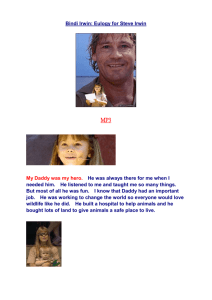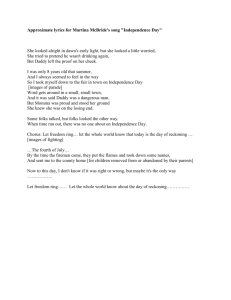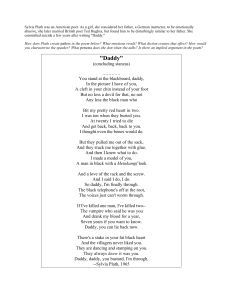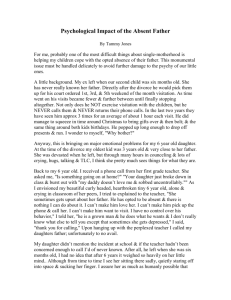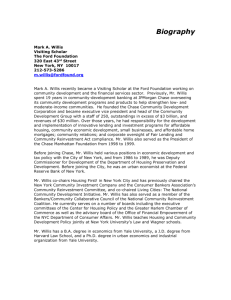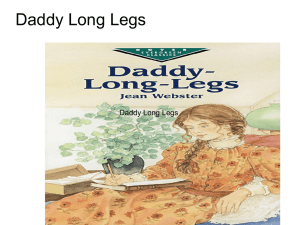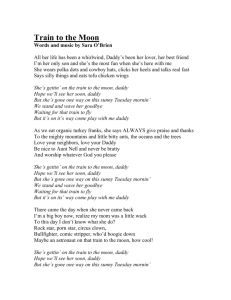HOUSE OF PURPLE CEDAR 1
advertisement
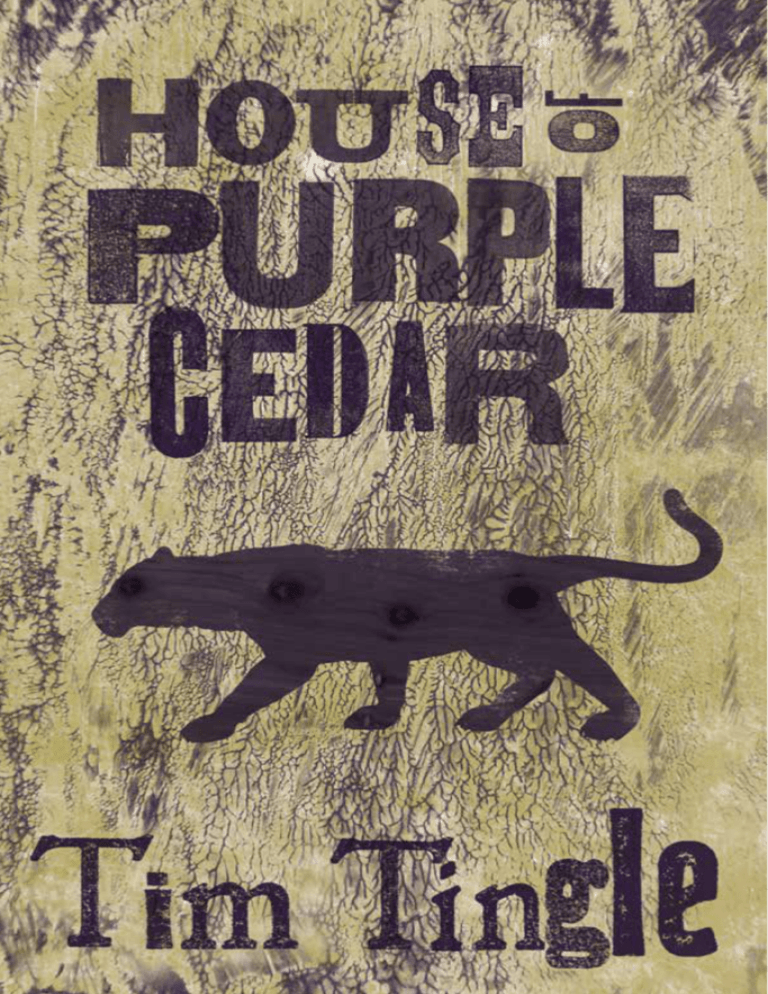
HOUSE OF PURPLE CEDAR 1 El Paso, Texas A Note Before the Reckoning Rose ~ Winter of 1967 The hour has come to speak of troubled times. Though the bodies have long ago returned to dust, too many ghosts still linger in the graveyards. You are old enough. You need to know. It is time we spoke of Skullyville. I was born and raised in the Choctaw town of Skullyville. I went to school at nearby New Hope Academy for Girls till it burned on New Year’s Eve, 1896. My grandmother went there too, and she met my grandfather when he was a student at Fort Coffee School for Boys. Till it burned. By the time the railroad came to Spiro, in what is now Oklahoma, all of downtown Skullyville had burned. The stores, the businesses, the stagecoach stop, all burned. We knew Nahullos set the fires. They wanted us gone. Almost everyone from that time is dead now, their faces blurred, their stories scratched like formal words in old, old letters. But once we were alive, all of us, and when good people, Choctaw and Nahullo both, step over our Skullyville graves, we sing as best we can, we sing those old hymns and songs, for they were everything to us. Our religion, our joys, even our sins, they all made up the music. We Amen! at the top of our lungs beneath the brush arbors, we sweat and toil in our gardens and fields and brood over our livestock and our babies both. HOUSE OF PURPLE CEDAR 7 I am speaking as a dead one now, and soon I will be. No time to waste. This story must be told. To see not only the unfolding of events but the meaning I ascribe to them, you must know of the vision, for the house of this story is built upon my vision. The dream came sometimes once a week, sometimes not so often, and always in the deepest hour of night, when neither day’s end nor dawn cast any light. This vision that I thought was a nightmare began when I was twelve years old. Though many years passed, in the vision I am always twelve, always sitting in the same church pew, always with my family in what at first appears to be a normal Sunday morning. Pokoni, my grandmother, has not yet entered the church. I am saving her a seat next to me near the window, where we can both stare out at the swaying trees. Brother Willis reads the scripture in that ponderous tone of his, before he lurches into a sermon “likely to raise the dead,” as Pokoni always said. When Pokoni appears, she walks past our row and approaches the altar, ignoring all else and staring at the wooden wall behind the pulpit. Soon everyone is following her gaze. Even after years of witnessing, I am still startled at the strangeness of the sight. A man, and I thought I might never know who it was, is slumped over and hanging, his clothing nailed to the back of the church. His body is slowly writhing, his head lifts with every breath, and his vacant eyes return our stare. Always when you thought you knew who hung before you, then you saw another. Brother Willis steps aside and Pokoni continues walking, but she now becomes a panther, black and silky-skinned, and now she is my Pokoni, then the panther once again. Through all the days of death and suffering, I longed to see the face of this writhing one, nailed to the cedar planks of our church. 8 TIM TINGLE Fire and Ice Young Rose ~ January 1896 I always feared death by ice. Much more than death by fire. Even as a little girl listening to Brother Willis preach about how the world would end, I was never afraid of fire, of burning up. Fire was warm and if it got to be too hot, you just scooted away. The only real problem with fire was starting it in the morning. Everybody else was asleep, and you had to climb out of bed and freeze your fingers fetching firewood so they could stay curled up and comfy. “Rose, are you up yet?” Momma said every morning, while the moon still shone and the sun hadn’t even thought of waking up. The walls in our house were so thin, she never had to shout. “Is it morning yet?” Daddy asked, and I could hear him roll over. I knew he covered his head with his pillow to block out the coming day. “It will be soon,” Momma always said. “No need to waste it.” No need to waste it meant they could sleep for half an hour longer, but I better get up and start the morning fire. My grandma and grandpa, Amafo and Pokoni, lived with us too. I guess it’s better said we lived with them since this used to be their house. Daddy liked to tell about cutting the cedar and sawing the boards, helping Amafo build this house when he was still a boy. HOUSE OF PURPLE CEDAR 9 “I was just a neighbor kid, but I knew if I was a good worker, he’d let me court your mother someday,” my father used to say. My little brother Jamey always made a secret face when he heard this. But there were no secrets, not from Momma. “You don’t want to be like those lazy Willis boys, do you, Jamey?” she’d say. “They get whippings sometimes. You don’t want a whipping, do you?” Course that never happened to me or Jamey, neither one. We never got a whipping. But the Willis boys did––and always by their momma––never by their preacher daddy. I never liked seeing anybody get whipped, but especially not the Willis boys. I know they gave living Hades to their big sister Roberta Jean, but there was just too many of ’em to expect anything good, and the how many of them there were, that wasn’t their fault. “Even a good man, a preaching man, brings troubles on himself sometimes,” Pokoni used to say, shaking her head at the Willis boys. I remember her saying that very thing one Easter Sunday when the boys buried the wooden baby Jesus from the Nativity scene. They buried him in the graveyard by the church to see if he would rise from the dead during the service. While Brother Willis was telling about how the stone was rolled away, seven-year-old George Willis started hollering. “Jesus lives!” he shouted. “He’s coming outta the ground right now! Everybody come see!” What those boys saw was a skunk stirring up leaves around the baby Jesus gravesite, but they didn’t know it. They all scrambled out the windows yelling louder than their daddy ever did. Blue Ned Willis was five at the time, and he chimed in with, “We’re going to meet Juh-eeee-sus!” He said it over and over again, sounding more like his daddy evey time. 10 TIM TINGLE The older boys saw Jesus first and were able to stop, but not Blue Ned. He plowed right ahead, stepping over the rise of graves, dodging tombstones, till he learned a life lesson he would never forget. One of the world’s ugliest sites is the close-up view of a skunk’s backside. With the tail raised. The skunk sprayed young Blue Ned with a cloud that could be seen––and smelled––from all the way inside the church. Blue Ned rolled on the ground, rubbing his eyes and crying. As the skunk disappeared into the woods, his brother George remarked, “Jesus just wants to be left alone, look like to me.” Reverend Willis simply prayed a closing prayer and waited by his wagon, his head bowed and clutching his Bible, while the Bobb brothers and Mrs. Willis handled the situation. Older brother Samuel, sitting on the front pew with his mother, never even turned his head to see what trouble his brothers were causing. He soon joined his father on the buckboard. We had been married for over forty years, Samuel Willis and I, and were visiting what was left of Skullyville one Sunday afternoon. He told me how later that evening, during one of his night walks, he found a rope and a burlap sack in the woods by the cemetery, the sort of sack one would use to tote a skunk. Someone, out of meanness, had planted that skunk to disrupt our Easter worship service. The memories came flooding back and we shook with laughter, a very hard thing to do, seeing how the woods had reclaimed our once fine community. “My daddy thought he would never get the congregation back. Every time he spoke the word Jesus…” “In that booming voice of his…” “I can hear him now…” HOUSE OF PURPLE CEDAR 11 “Wish we could…” “Someone would start coughing…” “To cover up their laughing.” “But he did it,” Samuel said. “Oh yeah. He did it. He brought us back. I don’t know who laughed that final laugh. I was too scared to turn around. I knew how mad he was getting, Sunday after Sunday. My father leaned over the pulpit and told us all, ‘Make your choice. Either get up and follow that Hell-bound skunk to the woods or let Jesus return to his church, but don’t be stinking up this temple with your laughter when his Holy name is spoken!’ Nobody laughed after that.” I thought Samuel was about to break out in tears when we came to the clearing where the church used to stand, where his daddy was buried, but he didn’t. Samuel just looked at the well-kept graves for the longest time. “I never thought they would burn the church,” he finally said. “At least the church was empty,” I replied. “The school was full of girls.” 12 TIM TINGLE First and Final days at New Hope Academy Rose ~ 1896 Yes, I always feared death by ice. But fire was nothing to fear. You could control fire. The sun was fire. Summer was fire. Cooking, that was fire. Ice was different. It rode the air. It stung everything it touched. Ice killed the corn, stopped the rivers, killed weak animals. On walks in the woods you would find them frozen dead, their mouths open and crying for something to stop this burning ice. Roberta Jean and I were boarding at New Hope Academy for Girls that year, rooming with twenty other girls. The school was only a few miles from home, but we were young girls. I was eleven and Roberta Jean was twelve. We would just be better off staying at school during the week, our parents figured. We were home by supper every Friday and back to New Hope after church and Sunday dinner. While home we gathered whatever we needed for the next week at school—clothes, pencils, knitting thread and needles. A week before Christmas we moved back home for the holidays. Christmas Eve we all climbed on Amafo’s wagon and Daddy drove us to church. For three hours we sang Christmas songs, in Choctaw, to welcome the baby Jesus. Away in a Manger was always my favorite. HOUSE OF PURPLE CEDAR 13 Christmas morning Daddy appeared with a wreath he’d carved from cedar branches. “I saw Maggie selling them at the hardware store in Spiro,” he said, “but I made this one.” The wreath was decorated with red and green ribbons, and he proudly hung it on the wall. When we opened presents, Daddy untied the ribbons from the wreath. “Rose,” he said, “these ribbons are for you, to wear when you go back to school.” “Yakoke, Daddy,” I said, and gave him a long, sweet hug. On the last day of December of 1896, the frost was sifting down, heavying the tree limbs with a silvery shine. We arrived back at school in the early afternoon. Tomorrow, New Years Day, was a grand day of celebration for everyone, girls and teachers too. The boys from Fort Coffee would wander over, those shy and mumbling boys who almost never spoke so you could hear them. We would share our first meal of the new year 1897 with the boys. The cooks from New Hope would work all morning, according to Roberta Jean, “dashing and fussing and frying and stewing,” while we girls put finishing touches on gifts we had made for our friends. Our boy friends! I was new to the school and I shook all over with excitement. Since I did not have a special friend, Amafo helped me make a pair of stickball bats for some nice young man. “Some lucky young man’s gonna get’em,” my Amafo said, whacking the sticks against each other. “These make good chant sticks come dancing time!” All the girls talked at the same time, showing everyone what they had made. Hoke, not everybody talked. I spotted Lillie, a shy little girl 14 TIM TINGLE and tiny as a toddler. She was sitting on the edge of her bed, folding and unfolding a blue handkerchief she had made. She didn’t talk. She never talked, at least not so anybody could hear her. Lillie was deaf and talked with her hands. I didn’t know her kind of talk, but I was learning. I walked to her bedside and she looked up at me. I pointed to the handkerchief and then to Lillie. She nodded quick and a bright new smile crawled across her face. I reached out my palms and she handed it to me. I held it to my face and made a big but soundless word with my lips. “Achukma, good,” I said. Lillie nodded and her hands made a sign. “Thank you,” they said. I knew that word. Besides Roberta Jean, Lillie was my favorite friend at New Hope. She was like my little sister, my sweet and precious Choctaw sister. Dark came early that night. “Everybody to bed,” Miss Palmer shouted. “We have a long day tomorrow.” The frost snuck up on us that New Year’s Eve. We were caught without any warm blankets. All we had were the school blankets of thin green wool, worn almost threadbare by years of use. I don’t know how long I had been asleep when Roberta Jean woke me up crawling under the covers. “Too cold to sleep alone,” she said, and her breath floated in the air. She brought her blanket with her and snuggled up close, but she was freezing cold from being out of bed for just a minute. She rolled over, facing away from me. The soles of her feet touched my calves. They were so cold I shivered, but I kept my mouth shut and just rode out this little sliver of cold, knowing that in a few minutes her body warmth would feel good and we could sleep like the Choctaw sisters we were. HOUSE OF PURPLE CEDAR 15 I soon drifted off to dreaming, dreaming about the most beautiful Sunday of my life. I was maybe five years old. The snow fell overnight in fat, light flakes, twisting and dancing outside my window when the moon peeped through. I pulled up the quilts, propped myself up and watched for hours, moving my palms in a snowfall hand-dance, all to the rhythm of the snow. I heard my grandfather creak down the stairs to light the fire. I leapt out of bed, wrapped the lightest quilt around me, and went to visit with him, just me and him. We could have a good talk. “Rose, baby. What you doing up so early?” “Just come to see you, Amafo.” “Well, ain’t that nice. You come set your blanket on the floor here by the stove.” Amafo was stoking the fire and, sure enough, he found live embers where nobody else would even think of looking. He pushed and poked ’em to burning, then turned to fetch more wood from the dog-run. “I’ll have it warm ’fore you know it,” he said. I curled up on the floor and fell asleep till he returned with two armloads of stovecut logs. I struggled to my knees to help, but Amafo said, “You just lay on back. I can do this.” When the fire was cracking and warming through the metal, he said, “Now, what we need to talk about, my Rosebud?” “Ummmm.” I stretched and yawned, smiling at him calling me Rosebud. “You think we’ll go to church today?” “Well, I think we will. Let’s take a look outside.” He scooped me up, blanket and all, and carried me to the front window. We could hear Daddy and Momma stirring in their room, but Amafo just looked their way without saying anything. This was our time. He held me over his belly with his left arm and pulled the curtain back with his right. 16 TIM TINGLE “Oh! Amafo, look!” The snow made hills and valleys in the front yard, swoops and dips of purest white, halfway up the tree trunks of the nearby evergreens. To the west the moon still hung yellow, but the sun was coming up. It colored the snow banks, pink and pretty as a puppy’s tongue. The pine limbs hung heavy with icicles, sparkling and dripping. “Yes, Rosebud, I believe we going to church. Snow’s gonna melt by noon, be mostly gone when church gets out. Be a purty good ride getting there, don’t you think?” “I think so, Amafo,” I said. “Yes, I think you probly right. Looks like we’ll be going to church. We better tell Daddy when he gets up. Maybe you can tell him?” “I ’spect I better,” said Amafo, carrying me to a nice warm spot by the stove. “Now, you take a little nap while I make the coffee. How ’bout that, hon?” “Okay,” I said, and in less than a minute I was sleeping sound. HOUSE OF PURPLE CEDAR 17
